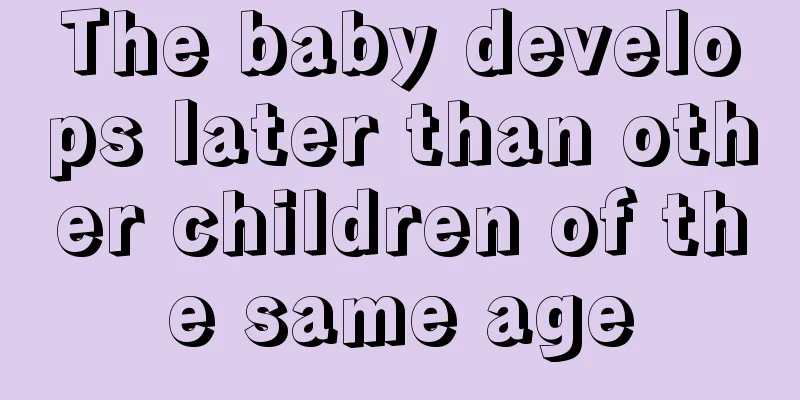The baby develops later than other children of the same age

|
It is difficult to judge whether a child's physical development is normal based on appearance alone, but problems can be discovered by comparing him with other children. The baby develops later than other children of the same age. This is a problem that many parents will encounter. What they are most worried about is that there is something wrong with the child's development, or even that there is developmental delay. It is very important to make a correct judgment and not simply compare the child with other children. Cannot reach for objects at 9 monthsIf you compare your baby with other babies, you will find that your baby still cannot reach out to get things on his own at 9 months old, and cannot support his weight with his legs when supported by an adult. This indicates that there is something abnormal with the baby and the baby should be taken for a check-up as soon as possible. Abnormal crying Some babies will cry for a long time due to stimulation, but sometimes they need repeated or continuous stimulation to make them cry; some babies cry sharply, while others cry softly and weakly; and some babies don’t like to cry and appear unusually "well-behaved". If parents learn to understand their baby's cry, they will know the hidden health signals. (1) If the baby suddenly screams loudly, without any echo, and the sound starts quickly and ends quickly. This kind of crying combined with other symptoms such as shaking head, straight eyes, staring, drowsiness, irritability, fever, convulsions, etc. may be a brain disease such as purulent meningitis. (2) If the baby suddenly stops crying or making noise and becomes overly quiet, this is also an abnormal phenomenon. Because some newborns are too ill to cry, we should pay more attention to careful observation and patiently find out the cause.
Some babies learn to chew relatively late, and are prone to swallowing difficulties and vomiting when eating solid food. The earliest symptoms shown by babies with intellectual disabilities are often difficulty in feeding, inability to suck, and being particularly prone to spitting up milk. This indicates damage to the nervous system and will affect their intelligence in the future. After the baby starts eating complementary foods when he is six months old, he will have difficulty chewing and feeding, and solid food will be difficult to swallow and may even cause vomiting. Difficulty in turning the head Some babies cannot hold their heads up or have difficulty turning their heads when they are over 100 days old, and one or both eyes continue to look inward or outward. At this time, parents can give their baby some head-lifting training. If there is no effect, they should take the baby to the hospital for examination immediately and ask the doctor the reason so as to discover the problem as early as possible and receive timely treatment. Sleeping too much and having trouble waking up Some babies will remain asleep and are difficult to wake up. Generally speaking, newborns under one month old need about 18 to 20 hours of sleep in a day. You may only be awake for about 3-4 hours a day, which is exactly the state of "sleep after eating". When the baby is 2-3 months old, he needs to sleep 16-18 hours a day; when he is 5-9 months old, he still needs to sleep 15-16 hours; when he is one year old, he needs to sleep about 14-15 hours. If the baby's condition lasts longer than a reasonable period of time, it is best to take the baby to the hospital for a check-up so that problems can be discovered and resolved in a timely manner.
The baby's expression has always been rather dull. He did not smile until he was 100 days old, and his expression was dull. At 6 months old, he still could not express himself naturally. It is understood that some babies with congenital intellectual disabilities have abnormal expressions on their faces and bodies. For example, children with congenital idiocy have eyes that are too wide apart, slanted eyes, flat noses, tongues that often hang outside the mouth, and drooling, which is what people often call an "international face." Children with hydrocephalus have particularly large head circumference, while children with microcephaly have particularly small heads. If you find anything wrong with your baby, consult a doctor immediately. |
<<: The development process of adolescent boys
>>: 9 and a half month baby development indicators
Recommend
What should I do if my baby has chickenpox?
It is quite common for babies to get chickenpox. ...
Calcium supplement for six-month-old baby
Calcium is an indispensable element in the baby&#...
What is the reason why children always wet the bed?
In life, many children have the habit of bedwetti...
Why do children not grow nails?
Nails are part of fingers, and their main compone...
The child drinks too much water and urinates frequently
Because the weather is dry, many parents like to ...
The child has a fever and has yellow eye mucus
It is a very common symptom in daily life for chi...
What to do if a 7-year-old child has poor digestion
When children are only seven or eight years old, ...
Is it normal that the umbilical cord has not fallen off after one month?
During pregnancy, the baby's umbilical cord i...
Introduction to the influence of boys' height development
Many boys are generally much shorter than girls i...
Is there still hope for a cure for benign epilepsy in children?
Benign epilepsy in children is a common brain neu...
What to do if your three-month-old baby wakes up suddenly during sleep
It is normal for a three-month-old baby to wake u...
Why does my child's foot hurt?
Children are more active by nature, and parents d...
Why does my baby have swollen eyes when he wakes up in the morning?
Every baby is the apple of the eye of the whole f...
Infants and young children have positive stool occult blood test
The baby's stool is a more intuitive reflecti...
Parents should be careful that their children may get "kissing disease" after being kissed
Recently, my baby suddenly developed a high fever...









